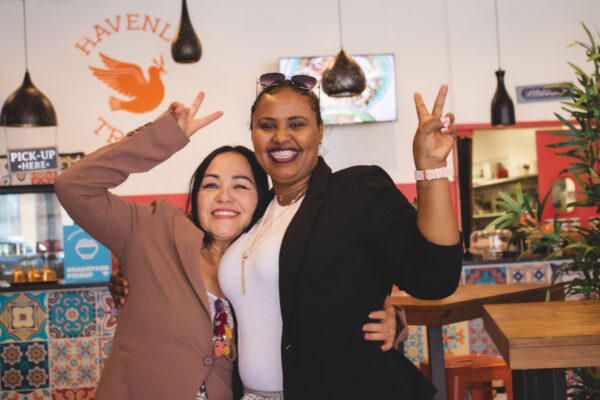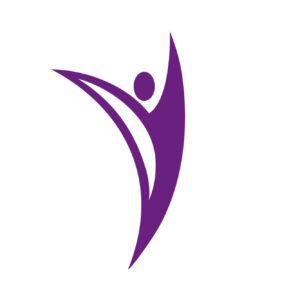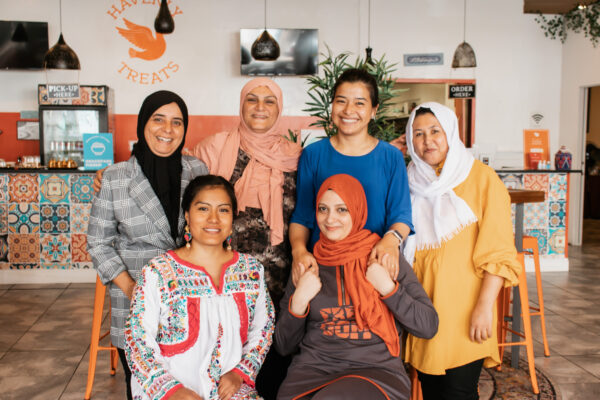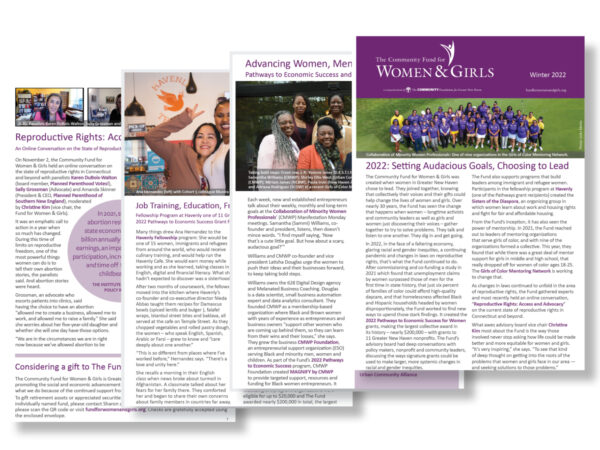Job Training, Education, Friendship and a Voice
Fellowship Program at Havenly one of 11 Greater New Haven Nonprofits to Receive 2022 Pathways to Economic Success Grant From the Community Fund for Women & Girls

Many things drew Ana Hernandez to the Havenly fellowship program: She would be one of 15 women, immigrants and refugees from around the world, who would receive culinary training, and would help run the Havenly Cafe. She would earn money while working and as she learned, taking classes in English, digital and financial literacy. What she hadn’t expected to discover was a sisterhood.
After two months of coursework, the fellows moved into the kitchen where Havenly’s co-founder and co-executive director Nieda Abbas taught them recipes for Damascus bowls (spiced lentils and bulger ), falafel wraps, Istanbul street bites and baklava, all served at the cafe on Temple Street. As they chopped vegetables and rolled pastry dough, the women – who speak English, Spanish, Arabic or Farsi – grew to know and “care deeply about one another.”
“This is so different from places where I’ve worked before,” Hernandez says. “There’s a love and unity here.”
She recalls a morning in their English class when news broke about turmoil in Afghanistan. A classmate talked about her fears for her family there. They comforted her and began to share their own concerns about family members in countries far away. “We were able to talk and cry together and support each other,” she says.
Havenly also helped Hernandez to find her voice. “We have an organizing collective for alumni and current fellows called the Sisters in Diaspora,” says Jane Dowd, Havenly’s co-executive director for development. “They recently finished a year-long campaign for fair and affordable housing in New Haven. We do lessons on giving testimony. How do you tell someone what is needed – in your own voice? It’s a very important skill not only for political or organizing campaigns but also in your everyday life.”
Hernandez, who is originally from Mexico, came to understand her housing rights when she became part of Sisters in Diaspora. It led her to speak to her landlord about repairs that needed to be done. She was also inspired to join another collective of women who are working together to open a new food business and she plans to take more courses in English after she completes the fellowship.
This past year, Havenly was one of 11 local nonprofits that received funding from the 2022 Pathways to Economic Success for Women grant program. Organizations were eligible for up to $20,000 and The Fund awarded nearly $200,000 in total, the largest collective award in the Community Fund for Women & Girls’ nearly 30-year history.
The grants were a rapid and direct response to a 2021 study commissioned and funded in part by the Fund. It found that unemployment claims by women surpassed those of men for the first time in state history; that just six percent of families of color can afford high-quality infant daycare or toddler programs; that homelessness affected Black and Hispanic households disproportionately; and that more Hispanic women reported food insecurity compared to women of other races and ethnicities.

2022 Pathways to Economic Success for Women Grant Awards
- All Our Kin - $20,000
- Boys and Girls Club of New Haven - $20,000
- CitySeed Inc. - $20,000
- Collab - $15,000
- Collaboration of Minority Women Professionals - $20,000
- Community Action Agency of New Haven - $20,000
- Havenly - $19,440
- Life Health, and Wellness Center - $15,000
- Spanish Community of Wallingford - $20,000
- Urban Community Alliance - $20,000
- Women & Family Life Center - $10,000
For updates on recent work at these nonprofit partners, click here.
From the very start, Dowd says the support from the Fund has allowed the Havenly Fellowship to truly take root and flourish. “It’s been extremely important for us to be able to bring more women into the program,” she says, noting that they began with two fellows, grew to four and now have 15 women per cohort. The continued support has allowed them to gather more data and information so that they can apply for federal funding.

This fall, the Havenly Fellowship received a $1.8 million American Rescue Plan grant as part of CareerConneCT, a program of the state’s Office of Workforce Strategy. The grant will fund the fellowships for the next three years and allow the Havenly team to seek support for new fellowship programs in other career areas.
The Havenly Fellowship was designed to be accessible to immigrant and refugee women. “We offer interpretative and dictation services in each language of the women in each cohort,” Dowd says, adding that even the fellows’ WhatsApp chat is translated. The courses run from 10:30 a.m. to 1:30 p.m. because most of the women are mothers of school-aged children.
“Our fellows are a group of people who have been marginalized in our country,” Dowd says. “They are immigrants, documented and undocumented. They’re women. They are working on their English language skills. They are mothers. The way the system is set up now, it’s nearly impossible for them to find and keep a good job.” But after finishing the fellowship, participants have gone on to study nursing and to pursue other job training and their GEDs.
“I’m so proud of all of the women,” says Abbas, who came to the U.S. from Iraq where she owned three restaurants. Here she could initially only find work in a cigarette rolling factory. She wanted immigrant women to have more choices and co-founded Havenly in 2018. “When many of the fellows come to the program, they have no job,” she says. “After six months in the program, they are so strong. They have self-confidence.”
Program alumni have opened their own catering businesses and a food truck on the Yale campus; they work in hospitals, universities, and daycare centers — and they have become leaders in their communities, Dowd says.

